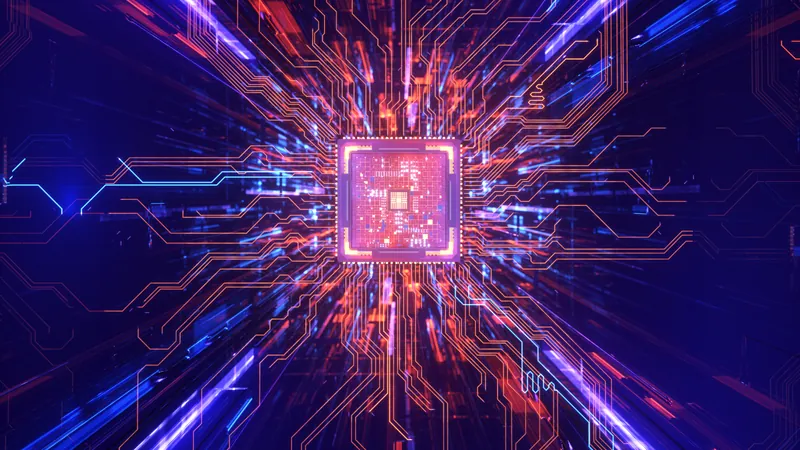
Quantum Machine Learning Set to Revolutionize Semiconductor Production!
2025-07-29
Author: Arjun
Microchips are the heartbeat of our modern world—found in everything from smartphones to smart refrigerators. Yet, the intricate art of fabricating these vital components has long been a daunting task. But groundbreaking research from Australia may just simplify this complex process forever!
A team of scientists has innovatively harnessed quantum machine learning—an exciting fusion of artificial intelligence and quantum computing—to transform microchip manufacturing. Their promising findings, detailed in a recent study published in *Advanced Science*, showcase how these advanced algorithms can dramatically refine the modeling of electrical resistance in chips, a crucial metric for enhancing efficiency.
The Quantum Leap in Chip Manufacturing
What sets quantum machine learning apart? Unlike classical computing, which uses bits (0s and 1s), quantum computing employs qubits that can exist in multiple states simultaneously. This allows quantum systems to tackle complex relationships at lightning speed, exponentially increasing processing power with each additional qubit.
By encoding traditional data into quantum states, researchers can unveil hidden patterns that classical systems often miss. This collaboration of quantum and classical systems results in a more adept analysis of data, paving the way for more effective manufacturing methods.
Inside the Semiconductor Process: A Precision Game
The semiconductor fabrication process is like a delicate dance—requiring precision at every turn. From layering countless microscopic films onto a silicon wafer to intricate patterning through photoresist coating and lithography, even the tiniest misstep can spell disaster.
A critical hurdle in this process is modeling Ohmic contact resistance, which measures the ease of electrical flow between metal and semiconductor layers. A lower resistance means faster and more energy-efficient chips, but achieving accurate models has been a persistent challenge.
Historically, engineers have relied on classical machine learning to address this issue. However, when it comes to semiconductor production, noisy datasets often lead to unsatisfactory predictions—enter quantum machine learning!
Revolutionizing Algorithms: Enter QKAR
Leveraging data from 159 experimental samples of gallium nitride high-electron-mobility transistors (GaN HEMTs)—renowned for their speed and efficiency—the team identified the key manufacturing variables affecting Ohmic contact resistance.
They then broke new ground by developing the Quantum Kernel-Aligned Regressor (QKAR), a novel machine learning architecture that translates classical data into quantum states. This enables the quantum system to uncover complex relationships, leading to a predictive model that can more accurately guide chip production.
In testing, QKAR outperformed seven leading classical models, including advanced deep learning techniques, achieving remarkable results in precision.
A Bright Horizon for Chip Production
Designed for compatibility with future quantum hardware, QKAR is poised for practical deployment as quantum machines become more reliable. The researchers conclude that these advancements could soon integrate into real-world semiconductor production, marking a pivotal shift in chip-making efficiency and effectiveness.
As quantum computing evolves, its application in semiconductor fabrication could redefine how we create the microchips that power our technology-driven lives. The future of microchip production is not just brighter—it may be quantum!



 Brasil (PT)
Brasil (PT)
 Canada (EN)
Canada (EN)
 Chile (ES)
Chile (ES)
 Česko (CS)
Česko (CS)
 대한민국 (KO)
대한민국 (KO)
 España (ES)
España (ES)
 France (FR)
France (FR)
 Hong Kong (EN)
Hong Kong (EN)
 Italia (IT)
Italia (IT)
 日本 (JA)
日本 (JA)
 Magyarország (HU)
Magyarország (HU)
 Norge (NO)
Norge (NO)
 Polska (PL)
Polska (PL)
 Schweiz (DE)
Schweiz (DE)
 Singapore (EN)
Singapore (EN)
 Sverige (SV)
Sverige (SV)
 Suomi (FI)
Suomi (FI)
 Türkiye (TR)
Türkiye (TR)
 الإمارات العربية المتحدة (AR)
الإمارات العربية المتحدة (AR)